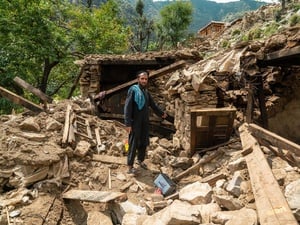UNHCR raises concerns over Afghan refugee forced returns from Tajikistan
UNHCR raises concerns over Afghan refugee forced returns from Tajikistan
UNHCR, the UN Refugee Agency, is raising grave concerns over the continued detention and deportations of Afghan refugees in Tajikistan, warning once again that forcing people fleeing persecution back to their country against their will is illegal and puts lives at risk.
In a latest incident, some five Afghans, including a family comprising of three children and their mother, were returned to Afghanistan on Tuesday (August 23) through the Panji Poyon border checkpoint in southern Tajikistan despite UNHCR’s interventions to halt the deportations.
"We are asking Tajikistan to stop detaining and deporting refugees, an action that clearly puts lives at risk," said Elizabeth Tan, UNHCR’s Director of International Protection. "Forced return of refugees is against the law and runs contrary to the principle of non-refoulement, a cornerstone of international refugee law."
Since 2021, UNHCR has recorded multiple incidents of refugee detentions, forced returns and non-admission to territory for individuals in need of international protection.
A UNHCR global non-return advisory for Afghanistan issued in August 2021 and renewed in February 2022, calls for a bar on forced returns of all Afghan nationals.
Afghans seeking safety must have access to protection and a fair and efficient asylum process in Tajikistan. Forced returns will place asylum-seekers at risk of persecution upon return and accordingly, constitute a serious breach of international law.
"We have continuously urged the authorities in Tajikistan to allow access to territory for those fleeing conflict and persecution in Afghanistan and halt any further deportations," UNHCR's Elizabeth Tan added.
UNHCR remains concerned about the risk of human rights violations against civilians in Afghanistan, including in respect of women and girls.
END
For more information, please contact:
- In Dushanbe, Nodira Akbaralieva, [email protected], +992 888 008480
- In Bangkok, Babar Baloch, [email protected], +66 80 086 5611
- In Bangkok, Kasita Rochanakorn, [email protected], +66 64 932 0803









